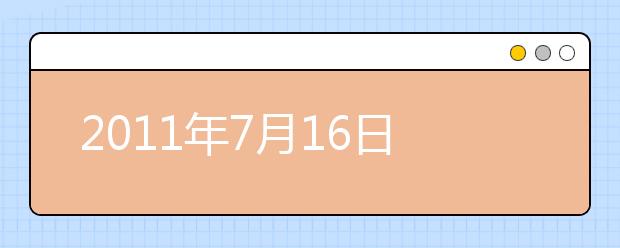当前城市:淄博[切换]
- 手机雅思无忧

扫码登录
雅思考试主要是通过对考生听、说、读、写四个方面英语能力的考核,综合测评考生的英语沟通运用能力,实现“沟通为本”的考试理念。对于雅思考生来说,也有很多考试难点和政策盲区需要帮助解答。今天雅思无忧网小编准备了雅思真题16口语练习 2021年4月16日雅思口语预测,希望通过文章来解决雅思考生这方面的疑难问题,敬请关注。
下面是2021年4月16日雅思口语预测,这次的无忧雅思口语预测是按照雅思口语考题的类别进行的排列,非常亏裂清晰明了,大家可以在自己的雅思口语备考中进行参考,让我们一起来看看吧。
口语:看预测及机经还是相当有用的。有时间看一下雅思网站雅思口语类新闻。
News
How do you get the news?
What kind of news are you interested in?
Is it the same for the old and young?
Is it important to know the news?
Numbers
what are the lucky numbers in China?
do you think that it is easy to remember names or numbers?
what is your method of remembering numbers?
Name
Do people in your country usually have middle names?
Is your given/family name a common one in your country?
Do any other people in your family have names with special meanings?
Does your name mean anything or have a special significance?
Would you like to change your name?
In your culture, do women change their names when they get married?
What are the most common names in your country/culture?
Study/work
What’s your subject?
Are you a student or Do you work?
Why did you choose it as your major?
Is your major difficult?
In what ways do you associate with your clas*ates in your major?
Which part of your subject do you think is most interesting?
What do you learn from your major?
What job will you have in the future? What do you want to do after graduation?
How to get the job you want?
What’s your job?
扮孝 What are you responsible for?
How was your first working day/ school day?
销缺闭Schedule/ daily routine
House/apartment/flat
Do you live in a house or an apartment?
What’s special about your flat?
What do you think is the most important thing in your room?
Will you recommend others to live in your flat, and why?
Do you want to change another house?
How long have you lived there?
Live alone or with others?
Have you ever been living alone for some time?
Surrounding?
What kind of community are you living in?
How is the traffic around your home?
Do you like the place you current live in?
Neighborhood
Do you know your neighbor?
Do you think it is important to have good relationship with ur neighbor?
How is your relationship with your neighbors?
How often do you meet them?
What kind of conflicts people may have with their neighbors?
Are your neighbors old or young?
Do you prefer the neighbor in your age or older than u?
Hometown
Where are you from?
Where do you live?
Would you say it’s a good place to grow up?
Where will you recommend to your friends in your city?
Transportations in your hometown
Where do you want to live, south or north of China?
What’s special about your hometown?
Do you like the city you current live in?
What do you like most about your hometown?
Do you like to live in a big city or a *all town?
Do you think your hometown has bright future?
Do your family and you live here for a long time?
Do you like to live with your parents?
Weather/season
What type of weather do you like?
What type of weather do Chinese people usually like?
What do you often do in sunny days? Cold days?
How does weather affect you?
Does weather affect people’s work performance?
Which is your favorite season?
What is the most common weather in your country?
Do you pay attention to the weather forecast?
What do you think about weather report?
Do you think people’s activities will change in different seasons?
Sound and noise
Your favorite sound from nature and why?
The noise you hate the most?
The types of sounds that you consider as noise
Do you like quiet environment?
What kinds of sounds remind you about your childhood?
Time/watch
Do you often wear watch?
What do you think of "time"?
How do you feel when you are late?
Do you sometimes feel that time goes slowly?
Collection
Do you like collect things?
Why do you have such a collection?
Did you like collecting things when you were a child?
What will you collect when you’re rich in the future?
What do Chinese people like to collect?
What can people learn from their collections?
Food & Cooking
Do you like cooking?
Do you cook at home?
Did you learn cooking in your childhood?
Will you cook in the future?
Who cooks in your family?
Is it important for young people to know how to cook?
Dancing
Can you dance?
Do you like dancing?
Is dancing popular where you live?
What kind of dance do Chinese people like?
Fruit/vegetable
What kind of fruit/vegetables do you like? Why?
Where do you buy fresh fruit and vegetable?
Is it easy (convenient to) buy fruit and vegetables where you live?
Do you like to eat fruit(s) and vegetables?
How often do you eat fruit and vegetables?
Did you like to vegetables when you were a child?
What are the benefits of eating fresh fruit (or, fresh fruits and vegetables)?
How much fruit and vegetables do you think a person needs to eat (everyday) to stay healthy?
Fashion/shopping
Do you like fashion?
Do you like shopping?
How often do you go shopping
Do you prefer to go shopping with friends or alone?
What makes you interested in shopping?
Do you think shopping is a waste of time?
What kind of clothes do you like?
Who buy clothes for you?
What’s the difference between big shop and *all shop?
When was the last time you went shopping?
Flowers
Do you like flowers?
Why do people like flower?
Do Chinese people grow flowers?
When was the last time you bought flowers/ gave flowers to others?
Why will Chinese people buy flowers? On what occasions do people give flowers to other people?
Do Chinese people grow flowers in gardens?
Do you like garden?
Do the old like flowers?
Are flowers popular in china?
Sports
What sport do you like?
Do your friends like sport?
Do you often do exercises at university?
Is there any sports equipment near your home?
How often do you do exercise?
Do you think it is necessary for children to do exercise?
Travelling by air
Do you like to take airplane?
How often do you travel by air?
What do you think the advantages and disadvantages of travelling by air? (compare with other means of transport)
What do you think the air travelling will be in the future?
Book/reading
Do you often read books?
What kinds of books do you usually read?
Did you read a lot when you were a child? If so, what were they?
Why don't you keep reading now?
Do you like reading?
Reading habit?
Where do you read books?
How long do you read per day?
Do you enjoy reading when you were a child? Now? Why?
Film
What kinds of film do you like?
Are these types of film popular in your country?
Do you prefer watch movies in cinema or at home?
How often do you watch film?
Driving
Do you have a driving license?
When is the appropriate age for getting a driving license?
Is driving skills important?
Do you (know how to) drive a car?
Do you think it’s important to get a driver’s license?
Language
What language do you speak?
What other languages can you speak?
Do you want to learn anther language?
How do you learn it (esp. English)?
Do you think learning English is difficult?
How do you improve your English?
Do you think learning languages is important?
Something helps you to learn another language.
TV program
Which/what kinds of television program do you like?
Do you like watching TV?
Which program makes you feel relaxed? Why?
Do you watch some foreign country programme? Why?
How much time do you spend watching television?
How do you feel about advertisements on TV?
What benefits can people get from watching ( foreign) TV programs?
Do you think watching TV can help students in their studies?
以上就是2021年4月16日的无忧雅思口语预测的部分,这些都是这次雅思口语的话题备考范围,大家在最后的备考的时候,参考这些话题范围,了解一些相关的背景知识,练习相关的口语题目,对于雅思口语备考是有一定的帮助作用的。祝愿大家的雅思口语取得好成绩。
A. 备考的早期,利用剑桥雅思真题系列做单项题型的训练
剑桥系列真题并非外界误以为的那样按照出版的顺序难度依次递增,也就是很多学生误解剑桥4最简单,剑桥12最难的原因。出版顺序完全是根据时间,换言之剑桥12的题目和文章来源距离现在更近。早期,如果按照单项题型进行有针对性,有密度的真题练习,可以很好的巩固课堂所学内容。此时不宜做套题训练,因为在对整个雅思阅读题型体系不完全了解的情况下做套题,很可能混淆题型和相应的技巧,也会造成有限的真题资源的浪费。
单项题型练习时,须注意学会探究和总结,千万不可将目光局限于正确率。答案的正确与否虽然从一定程度上可以表明对知识点的掌握,但从错误中学习更有利于从本质上提高。每种题型的考点都不一样。比如summary(归纳摘要),更注重考查的是对空格上所填单词的预测判断,所以在练习后,更多的是总结常考的语法点,固定搭配。比如:剑桥5“Johnson's Dictionary”的summary题中一个空格:a number of___, who… 空格上填写的应是可数名词复数形式,而且表示人,在找寻答案时,我们会更关注-s/-es为结尾的词,且和人有关。再如:剑桥6“The Climate Change and The Inuit” summary题中第一空:engage in___这里考察的是一个固定搭配“engage in doing sth. “忙于从事某事。如果知道这个固定搭配,答案很快就会锁定在有动词ing形式的单词上。而Matching题中的细节配对题考查的主要是对近义词的熟练把握和对不同文体的文章结构的了解。比如剑桥4 “Obtaining Linguistic Data”中的一道细节配对,“how the informant can be helped to be less self-conscious”, 同义替换的意识可以总结出来,less是little的比较级,表示否定,去原文找表示否定含义的词;conscious的高频替换对象是aware,这样找答案时目标就更加明确了。所以,在做任何其他题型的时候都注意题目和原文的近义词累积会有助于细节配对题的做题效率。另外如果对说明文,议论文,实验报告类文章的结构非常熟悉,也有利于配对题预测答案所在段落,也就是说除了总结题型之外,总结文章的写作模式也很重要。是非无判断题,在做题后,需多多总结归类判断题的考点:比如在整个剑桥系列真题中常考察比较级,最高级,数字(时间)等。
但大家在做单项练习时,应适当留出一些完整的套题供后期使用。
B. 复习后期,做套题训练
在完全掌握了雅思阅读的各项题型技巧后,需要用套题来拉近和考试的联系。因为笔者发现,在单项题型练习时,很多学生的正确率很不错,但到了各项题型杂糅在一起,做套题训练时,水准就会有明显下降。这是因为a. 很多同学无法选择合理的做题顺序,导致易得分的题目没有时间做,难题花了大把的时间也并没有有助于正确率。经过套题练习,主要是能够快速反应不同的题型配备,用不同的先后做题顺序。b. 每项题型的技巧都不相同,是否有顺序原则也各异,快速的反应并在各种题型之间转换会给考生造成一谨虚定的困难,所以前期对各项题型技巧的完备掌握甚是重要。在做套题时一定要有时间的控制,每篇文章祥拍燃不超过20min,这样才更能模拟考试现贺孙场。
C. 剑桥系列某些热门话题,高频话题文章的精读
众所周知,剑桥雅思真题的文章和历年考过的话题在实际考试中会出现重复的可能性,即所谓旧文章,比如,2月18日的考试中出现的“New Ice Age”就和我们剑桥真题8的“The Little Ice Age”几乎一样。如果之前对该话题有所涉及或对文章做过精读,考试时自然对这篇的理解和做题驾轻就熟。精读文章的目的一来是了解话题的背景知识,再者可以累积话题的高频词汇,遇到同话题文章,生词问题迎刃而解。比如剑桥4的第一篇关于“rainforest”的文章和剑桥7“deforestation”一文在结构(平行结构)和高频词上就有很多雷同之处。此外,从根本上提高阅读能力的途径是精读文章,只有这样才能锻炼处理长难句的能力。当然,不是每篇文章都有精读的价值,比如剑桥5上“Bakelite”一文话题过于专业,和其他话题的文章融合度小,就无需精读。一些在机经中常出现的话题则是我们选取精读文章的标准,比如环境类,教育类,文化类。
D. 剑桥系列真题的文章也是口语、写作的观点来源
口语,写作考试中常常出现考生对话题不熟或紧张无法给出好观点的情况,这时候,阅读真题中的一些好文章正好成为了观点供应商。比如:剑桥5的“The impact of Wilderness Touri*”就是一篇很好的环境类文章的参照。
E . 对听说读写四个部分内容做总结,将相关部分常出现的学术性词汇和每篇文章的主题词汇汇总。 由于听说读写四个部分对单词的要求不一样,因此建议大家将相关的高频词汇做汇总,进行分类记忆!做完题目后,一定要认真仔细核对答案。当然,在对答案的时候,不是说简单地核对正误,而是要将相应的答案依据在文章中找出来。对于做错的问题,更是要找出原因,分析出错的原因并加以改进。
F. 真题中的考官范文的使用: 我们就以一篇考官范文为例,带你深度剖析,雅思作文的高分之道。
选自剑桥雅思真题集 C8 - T1
Some people think that parents should teach children how to be good members of society.Others, however, believe that school is the place to learn this.
Discuss both these views and give your own opinion.
首先进入到文章的开头段:
A child’s education has never been about learning information and basic skills only.(1) It has always included teaching the next generation how to be good members of society.(2)Therefore, this cannot be the responsibility of the parents alone. (3)
我们可以看到,本段虽然无生词:但文章中第一句话用“never”及“only”, 最后一句用“not”及“alone”, 考官都运用了双重否定表肯定, 从而增强句子语气。
同时第二句中的 the next generation 也符合less common vocabulary。 增加了词语表达的丰富性。
接下来我们进入到文章的主体段1:
In order to be a good member of any society the individual must respect and obey the rules of their community and share their values.(1) Educating children to understand the need to obey rules and respect others always begins in the home and is widely thought to be the responsibility of parents.(2) They will certainly be the first to help children learn what is important in life, how they are expected to behave and what role they will play in their world. (3)
首先来看句1和句2, 运用了特殊开头词的写作形式:“in order to ”(介词短语放句首)及“Educating”(动名词放句首)。
大部分童鞋写句子时, 名词代词放句首的偏多, 特殊开头词引出句子的方法,可以尝试 ~
再来看句子中的 respect and obey 这组, 及what...how... and what 这组, 两组都属于平行结构, 一组是短语平行, 一组是从句平行。 三个从句写出来, 不仅句子长度拉长, 同时还展示了书写从句能力!
最后来看句子2的谓语, 共有两个, 分别为begin 及 be widely thought , 一主动一被动, 这又何尝不是增加句子灵活度的方式?
然后是文章的主体段2:
However, learning to understand and share the value system of a whole society cannot be achieved just in the home.(1) Once a child goes to school, they are entering a wider communitywhere teachers and peers will have just as much influence as their parents do at home. (2)At school, children will experience working and living with people from a whole variety of backgrounds from the wider society. (3)This experience should teach them how to co-operate with each other and how to contribute to the life of their community. (4)
句1, 一方面双重否定表肯定了 not 及just用法,同时还起到了承上启下的作用,起到对学校教育的论述。
句2, once及where引导两个从句做嵌套, 句子虽长, 但论述逻辑清晰。 段落的句尾再次出现平行结构, 也是为了和上段做呼应。
But to be a valuable member of any community is not like learning a simple skill. It is something that an individual goes on learning throughout life and it is the responsibility of every member of a society to take responsibility for helping the younger generation to become active and ablemembers of that society.
最后的结尾段, 往往要给出观点及看法, 这里我们看到考官在给观点时用到了这样一个短语“active and able”。大部分人看到后没有任何感觉, 但他实际用的是押头韵的用法。
和其相似的还有, Beauty and the Beast, League of Legend 以及 Pride and Prejudice等等。只要留心, 这种在电影及杂志上的材料,不妨细心积累,放入你的作文库中。
这就是C8T1的范文, 对大部分人来说, 这篇材料是没有生词的。 但考官就是用了双重否定表肯定、特殊开头词、平行结构及押头韵等等表达了多样的句式!
所以我们看出, 真正好的作文不是生词长句, 像考官材料一样,用简单词表达多样的句式,也同样能帮你拿到作文高分哦!
雅思考试需要准备的资料有真题机经、词汇书,另外听说读写都有相应的备考资料。
但是市面上的备考资料特别多,要学会甄选,选择适合自己的备考资料。
虽然说不同的人选择的备考资料不同,但是大致其实是差不多的。旦灶
人手必备汪闷:剑桥真题剑4-剑15
请珍惜每一套雅思真题,不要还没有开始复习就拿着真题盲目的刷题,真题做一套少一套。最理想的刷题效果是:每做完一套题都可以看到自己的进步,阅读和听力的正确率上升。
词汇:雅思官方词汇书
光是这个名字就已经是够权威的了。这本书相当的人性化,提供了听力,阅读的题目,将单词放在具体的情景之中,有效的提高单词模陵扮的记忆率,降低遗忘率,同时完成听力,阅读等雅思题型的练习,时间效率双倍化。
听力:听力真题,TED演讲
TED演讲大家可以当作泛听来训练,平时可以在坐公交跑步的时候来听,全当作熟悉英语发音来练习。
口语:思润雅思2021年雅思口语题库汇总,雅思哥APP
思润口语教师根据雅思每场考试总结出Part1共30个话题,part2和part3共16个话题,同时更新了2020年第四季度的口语预测,建议考鸭们把考前两个月的考试话题都准备一下,抽中的几率还是非常大的。
写作:思润写作要点精讲,评估与批改系统
虽说写作不是立竿见影就能拿到高分的,但是按照思润的写作方法和思路总结却是行之有效的,他教你怎么按外国人的思路组织语言,还帮助考生补充词汇和词组。同时配备的评估和批改系统,帮助考生查漏补缺。
雅思考试需要准备哪些资料
2021年8月16日雅思口语回忆(网友版)
以下是部分口语提前的考生回忆:
1、湖北大学,RM5。
P1住哪儿,是否喜欢,准备一直留这里吗,做饭,谁做,小时候帮忙过吗。
P2一件你帮助别人的事。
P3你认为小孩子能为家长帮什么忙,什么事可以增加他们的责任感,中国的职业环境好吗,一个好的雇主需要提供给雇员什么?
2、湖大RM15,8.16那场.
3、武汉ielts考试中心 房间15
P1 rainyday dictionary best time to study
P2 positive experience
p3 old and yong generations
4、湖北大学room13.part1 学校专业做饭 part2喜欢的运动 part3 中国*出台的提倡全民健身政策
5、湖北大学RM4,207 part1 name.study.street market.
part2friend
part3 how to make friends?will you make friends with someone that share nothing common with you?why people make friends on internet?
6、湖大RM9。P1我是什么职业,在哪上学,平时喜欢做些什么,喜不喜欢去公园。
P2问的是城市。描述一个城市,第一次去为什么,有哪些好的和不好的。
7、首经贸,RM4,part2问的good law in China,part3有问到警察这个职业好不好,为什么
8、湖北大学,RM12 part1 喜欢去公园还是花园 公园该怎么改建 part2 学一门除英语以外的一门语言,如何学习的 part3 什么人学英语 英语课堂如何改进 中文有什么改变
9、湖大RM5,白人,和蔼,1work/animal/wild animal;2park/garden;3green area/food quality between city and townvillage
10、太原理工rm04
11、湖北大学RM5 part1 fullname cooking dictionary part2 other culture part3 the way to learn other culture, past and now,other culture in film
12、湖北大学r4,居住地 家乡 喜欢态手的食物 拍照p2家庭聚会 p3婚姻观 目测常规题
13、太原理工r m 3 回忆 part1 study map what do u do on weekend? What do you want to change in a week?
Part2 a time when your equipment has a problem
Part3 How do you repair broken equipment.? Other equipment people used in the past.
14、太原理工大学 room02 p1 clothes,language,hometown等
p2 an intellengent person 最后问我希望这个人当你男朋友不...深戳他笑点
p3 如何培养孩子的智力,家长在教育中扮演怎样的角色,男女老师的教学差异,寓教于乐的教学方法,如何培养对艺术的兴趣。
15、湖大,R8白人小册穗伙,很大方,热情 p1,major,rain
p2,你忘记做的事
p3,什么事容易被忘,怎样帮助记忆,好记忆对学习新技能的帮助,老州闭卜师和博士为什么需要好记忆。。。
16、湖大rm12 P1 学习 / 工作 学习的地方 博物馆 / 艺术馆
P2 一个外国的电影
p3 各种关于电影的话题 比如 中国容易看外国电影嘛、哪个国家的电影受欢迎、看电影有利于英语的学习嘛
17、东南大学room421,part1:work or study、drive car、maps、
part2:animals,虽然是老话题但没准备,不知所云,考官果断结束了我的挤牙膏。
part 3:wild animal ,goverment duty等等
18、东南328,P1,家乡,有什么不满意的地方,电视节目,学科,P2,喜剧演员(in your country),P3,关于film actor的问题,是不是赚的太多的之类的,
19、北外rm09 part1 work or study,major,subject一系列问题,study in the morning or afternoon
part2 positive experience in your teenager years,
part3关于teenager和old people的好多问题
20、交大room4 part1:name living study or work在哪里上学为什么在那里上
part2:分享是什么,你会与谁分享以及分享,分享后对自己的影响
part3:人为什么要分享,小孩不会给我别人分享什么,大人怎么教小孩分享,老师怎么教小孩分享
21、天津11:05。rm12胖胖的白人大伯,神打断,一直打断从未停止,p1:cook music p2: a present you received when you are a child p3: different people like different presents.
22、北外rm02。P1开学第一天,为什么选这个学校,注意力集中,为什么有人爱住在亲戚家或者朋友家。P2一个远离家的地方 p3关于hotel的好多问题。你认为hotel最重要的是什么,那些高档酒店重要么,
23、深圳赛格VIP4 part1 work or study/major/favourite animal/animal in the zoo
part2 sports that you play or watch part3 popular sports in China/people do the sports now and in the past
24、天津考场room4 第一部分 家乡 你喜不喜欢,会不会常住 。问喜不喜欢雨,你觉得哪下雨比较多。 第二部分 你这个城市的建筑 第三部分 有什么老的建筑在你的国家,你觉得老的建筑与新建筑的比较
25、问了一些关于中国人对于 家的理解 年轻人是否需要和老年人相处 之类的。时态错了很多 希望其他童鞋注意。长沙 rm9
26、石家庄R3,1住哪,对那的人了解么,用地图么,谁教你,纸的还是电子,喜欢street market么,想去国外的street market么为什么,为什么人们喜欢去street market 2* 3为什么人们喜欢发短信,微信和短信的区别,为什么用微信还发短信,谁用*多
27、贵大,room01,11.35考,part1,study or work ,clothes pattern 在学校你穿什么衣服,你小时候的你怎么打扮的,part2 你忘记做一件事,when and why。part3关于记忆的。什么样的人比较容易忘记做事?记性不好对工作有什么影响等等
28、深圳赛格VIP8 P1live,school,clothesP2,a sport you like to do P3各种运动,以及*还是私人投资运动员哪个好
29、深圳赛格v7 p1 living place &bithday 问了好多…… p2 interesting animal p3 TVprogram对珍惜动物的好处,zoo好还是不好,学校要教孩子保护动物么 ,孩子照顾动物有什么好处,*怎么保护稀有动物,公众怎么保护动物
30、回忆:天津,房间7,1,住的地方,交通,博物馆p2学校朋友,有小变动,3,怎么交朋友,小时候朋友和长大了的有什么不同,你觉得小时候的朋友不是真友谊吗,用什么方式交朋友,如果这个人不爱去聚会怎么和她交朋友
以上就是雅思无忧网为您准备的雅思真题16口语练习 2021年4月16日雅思口语预测全部内容。访问雅思无忧网(https://www.yasi.cn/),了解更多雅思考试新消息,新动态。
雅思培训 2011年7月16日雅思考试大预测
2011年7月16日雅思考试大预测
【2011年7月16日雅思考试预测】;预测有风险,使用需谨慎!● 近来题目较为简单,但也不可掉以轻心
2021年08月30日 20:31 2011年4月16日长春IELTS考场临时变更
2011年4月16日长春IELTS考场临时变更
雅思考试主要是通过对考生听、说、读、写四个方面英语能力的考核,综合测评考生的英语沟通运用能力,实现“
2022年12月09日 12:36 2011年4月16日成都及重庆考点部分考生雅思口试在4月15日进行
2011年4月16日成都及重庆考点部分考生雅思口试在4月15日进行
雅思考试主要是通过对考生听、说、读、写四个方面英语能力的考核,综合测评考生的英语沟通运用能力,实现“
2022年12月09日 12:46 2011年4月16日济南IELTS考场变更通知
2011年4月16日济南IELTS考场变更通知
雅思考试主要是通过对考生听、说、读、写四个方面英语能力的考核,综合测评考生的英语沟通运用能力,实现“
2022年12月09日 12:48 雅思口语part21-4月题库 雅思口语机经:2011年4月16日Part1
雅思口语part21-4月题库 雅思口语机经:2011年4月16日Part1
雅思考试主要是通过对考生听、说、读、写四个方面英语能力的考核,综合测评考生的英语沟通运用能力,实现“
2023年09月11日 02:21 雅思口语part1题库2019年5月 雅思口语机经:2011年4月16日Part1
雅思口语part1题库2019年5月 雅思口语机经:2011年4月16日Part1
雅思考试主要是通过对考生听、说、读、写四个方面英语能力的考核,综合测评考生的英语沟通运用能力,实现“
2023年09月11日 20:51 雅思口语题库pArt1机经 雅思口语机经:2011年4月16日Part1
雅思口语题库pArt1机经 雅思口语机经:2011年4月16日Part1
雅思考试主要是通过对考生听、说、读、写四个方面英语能力的考核,综合测评考生的英语沟通运用能力,实现“
2023年09月12日 02:24 2014雅思口语题库part1 雅思口语机经:2011年4月16日Part1
2014雅思口语题库part1 雅思口语机经:2011年4月16日Part1
雅思考试主要是通过对考生听、说、读、写四个方面英语能力的考核,综合测评考生的英语沟通运用能力,实现“
2023年09月12日 08:49 雅思口语4课本练习题答案 雅思口语机经:2011年4月16日Part1
雅思口语4课本练习题答案 雅思口语机经:2011年4月16日Part1
雅思考试主要是通过对考生听、说、读、写四个方面英语能力的考核,综合测评考生的英语沟通运用能力,实现“
2023年09月18日 12:33 雅思4月口语真题 雅思口语机经:2011年4月16日Part1
雅思4月口语真题 雅思口语机经:2011年4月16日Part1
雅思考试主要是通过对考生听、说、读、写四个方面英语能力的考核,综合测评考生的英语沟通运用能力,实现“
2023年09月20日 14:18